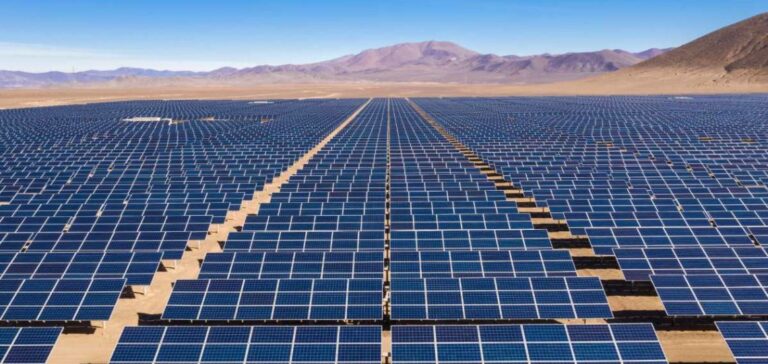IRENA warns of the significant delay in the global energy transition in its World Energy Transitions Outlook 2023 Preview report. This was presented at the Berlin Energy Transition Dialogue (BETD) by Francesco La Camera, Director General of IRENA.
Bold and transformative measures needed to catch up on the energy transition
According to the report, to reach the 1.5°C goal, we need to grow from 3,000 GW to more than 10,000 GW by 2030, which requires an average annual deployment of 1,000 GW. Although the power sector has made progress with 40% of the world’s installed power generation coming from renewables, this is limited to certain parts of the world, leaving developing countries further behind.
Indeed, the report stresses that bold and transformative measures are needed to achieve an energy transition that reflects the urgency of the current situation. Comprehensive policies and aid must bring about the necessary structural changes.
IRENA advises on the necessary deep and systemic transformation of the global energy system
Francesco La Camera stated that the stakes could not be higher and that a profound and systemic change in the global energy system must occur in less than 30 years. This illustrates the need for a new approach to accelerate the energy transition. The focus must shift from supply to demand to overcome structural barriers to progress.
The three priority pillars for catching up on the energy transition
The IRENA overview describes the three most important pillars of the energy transition as physical infrastructure, policy and regulatory enablers, and a skilled workforce. To maintain these objectives, significant investments are needed as well as new modes of cooperation, in which all actors can engage in the transition and play an optimal role.
Insufficient investment to meet climate goals, says IRENA
Investment in energy transition technologies has reached a new record of $1.3 trillion in 2022, but this is not enough to meet climate goals. Annual aid must quadruple to more than $5 trillion to stay on the 1.5°C trajectory. By 2030, cumulative investments must total $44 trillion, with transition technologies accounting for 80% of the total, or $35 trillion.
Redirecting investments to transition technologies and infrastructure
Any new aid decision must be carefully evaluated to drive the energy transition together and reduce the risk of stranded assets. Unfortunately, some 41% of the projected funds by 2050 remain targeted at fossil fuels. This is a huge challenge. Investors need to redirect about $1 trillion in annual funds expected in fossil fuels by 2030 to transition technologies and infrastructure to keep the 1.5°C goal within reach.
Catching up with the energy transition requires public sector intervention
In addition, public sector intervention is needed to channel funds to countries in a more equitable manner. In 2022, 85% of global investment in renewable energy benefited less than 50% of the world’s population. Africa accounted for only one percent of the additional capacity in 2022. This shows that the regions that are home to about 120 developing and emerging markets still receive relatively little investment.
Finally, it is essential to rewrite international cooperation to make it stronger, including joint efforts to channel more funds to developing countries.
According to the Camera, a change in support for developing countries must put more emphasis on energy access and climate adaptation. Multilateral financial institutions must therefore direct more funds, on better terms, to energy transition projects and build the physical infrastructure necessary to support the development of a new energy system. These projects can help accelerate progress over the next five years toward 2030.
IREAN’s vision linked to the Paris Agreement
The World Energy Transitions Outlook (WETO) report developed by IRENA provides a global view of the energy transition. It is designed to be consistent with the goals of the Paris Agreement, which aims to limit global temperature rise to 1.5°C. WETO aims to provide specific guidance for achieving the 2030 greenhouse gas emission reduction targets.
The next edition of WETO at COP28 will be held in the United Arab Emirates in 2023. This report will measure the effectiveness of the measures taken for the energy transition. The goal is to accelerate progress over the next five years and demonstrate that states are meeting the commitments made at COP21.
WETO will release the full report later this year, which will create a great deal of expectation from stakeholders to evaluate the actions taken and find more effective ways to combat climate change.





















